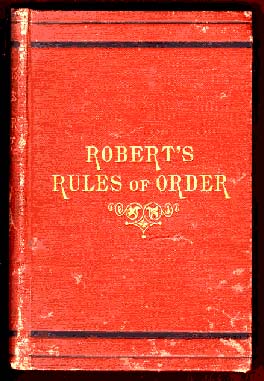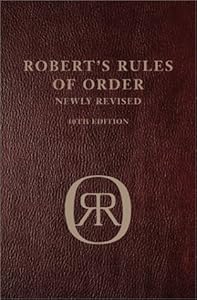The Hole on the End of the Bible Belt
Overlooking Specks

Yesterday I mentioned Robert's Rules of Order. It is a wonderful book if you want to be precise. If you want to be happy and not bent out of shape when you attend organizational meetings, and especially City Council Meetings (does not matter at all which city), you do not want to read any of it as the people running the meetings have not. Even the person known as the Parliamentarian rarely ever reads it.
In trying to make things run uniformly Robert created the rules and eventually not only were they published, but they were accepted as The Standard of parliamentary procedure. Robert was an engineer, and engineers tend to be precise. Often that is their problem. We tend to think of things in precise terms and want to have them compartmentalized so that they can be handled, or controlled. There is a motion for correcting actions that are not done properly, which can only accurately be used by one who knows the rules. Invoking this can make the person seem condescending or controlling, or sometimes just annoying and abrasive.
Engineers tend to be abrasive, not only because they try to be precise and correct, but because they boil things down to he base and point out inconsistencies. For my part, I have been known as being abrasive to other engineers. I don't mention this because I'm proud, but because I recognize my own annoying characteristics particularly that of trying to correct what is wrong.
After reading Robert's Rules of Order, I began to realize how few people knew how things were really supposed to run and took it as my job to correct and inform them. It did not take long before I realized the complete futility of this. Nowadays I try really hard to screw on my filter and not "fix" the problem. This in turn has helped in a few other areas as well, but sometimes it can go too far.
A few weeks ago in Sunday School, my teacher made a statement that I absolutely disagreed with, but I kept my mouth shut. When he mentioned that I was particularly quiet, it opened the discussion back on the point and completely changed the direction the class had been heading. As we walked out I went on disregarding the matter, thinking nothing more of it. The next week, everyone else had been studying and reviewing the matter, so we spent another week talking on the point.
Ignoring and accepting can be a great way to not get bent out of shape on the minor points of life, but when we extend it we run the risk of missing out on something much bigger and more important. Don't compromise correctness merely for the sake of getting along
Related articles
- What Decision Will You Make(Jason Fountain)
- Robert's Unread Rules (byrdmouse.com)
- Specks and Beams (byrdmouse.com)
Robet's Unread Rules

Despite the fact that most people claim to use Robert's Rules of Order for parliamentarian procedure, few do so. Even fewer realize it, and still fewer have actually read the book. Being one of the very few sometimes gets to be a pain, at least if you want things to go by the book.
Some common examples of procedures that are not according to Robert but done are to call for a vote for a motion followed with saying, "Those opposed by the same sign." If the vote is by the same sign, it is a vote for the motion and not against. One of the matters that bugs me the most is when something is "Laid on the Table." The proper motion is to postpone for a set (indefinite is acceptable) time. The Lay on the Table motion is to set something aside to handle an urgent, pressing matter, which is then followed by resuming the first motion. Oftentimes, the Lay on the Table motion is used to kill a matter that no one wants to vote on. At a recent City Council meeting I witnessed the Council repeatedly vote to suspend the rules. It was the correct motion, (since they wanted to avoid a vote on Unanimous Consent and consider something for immediate adoption rather than wait for another meeting) but the point here is that it is a regular occurrence to suspend the rules. Why have the rules if you're going to simply suspend (or ignore) them?
Organizations and governmental bodies do things the same way. They believe they are right, but the reality is they are just as wrong as the last person they saw doing it. Copying the last group has become the norm. Everyone expects things to run by the same procedure as before.
As Christians we are often similarly comfortable. We want our church services to be the same, the preacher to finish on time, the prayers to last as long, etc. Many times we want to deal with people in a certain way and for a set period of time or when nothing is bothering us. When we are annoyed we act differently. As C.S. Lewis put it in the Problem of Pain, "Everyone feels benevolent when nothing happens to be annoying him at the moment."
Just like the complacency in parliamentarian procedure, we get complacent in our Christianity copying those that came before us. Every now and then we need someone to come along and remind us to read the Book.